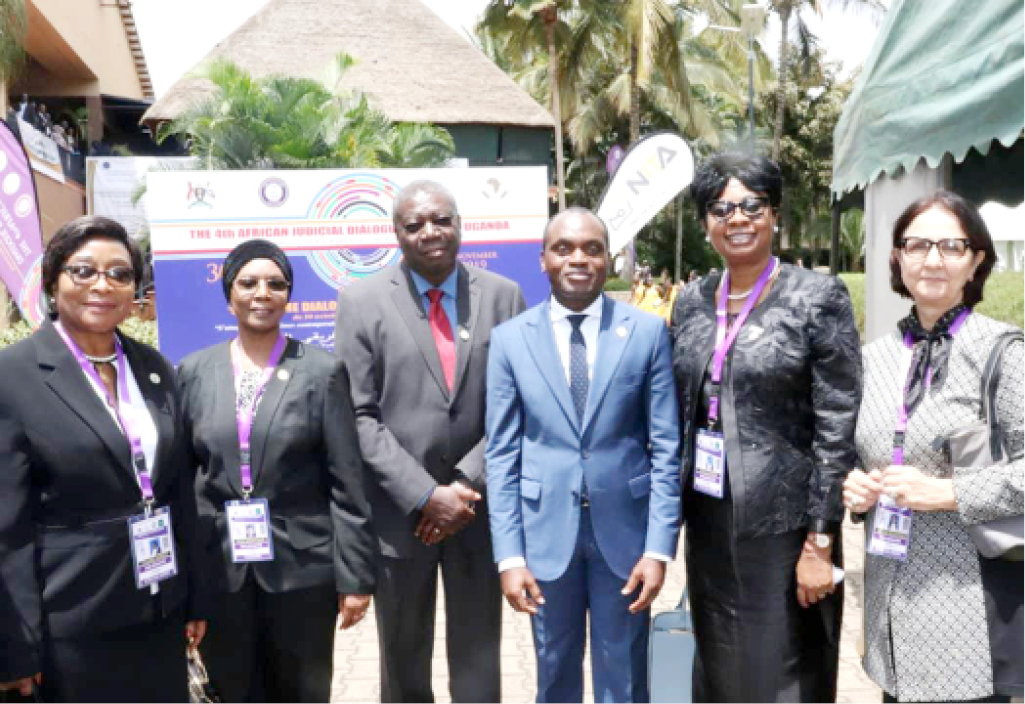Why African Court experts listed poverty, bad governance as rights issues
Experts on judicial and human rights from around the globe assembled in Kampala, Uganda from October 30 to November 1 for the Fourth Judicial Dialogue of the African Court on Human and Peoples’ Rights. One of the key decisions of the participants from member states in their communique read by the President of the Court, […]

From left: Justice Ntyam Ondo Mengue (Cameroon); Justice Imani Daud Aboud (Tanzania); an official of the court; the President, Justice Sylvain Ore, Justice Stella Anukam (Nigeria); and Justice Bensaoula Chafika (Algeria) during the 4th Judicial Dialogue of the African Court in Kampala, Uganda recently.
Experts on judicial and human rights from around the globe assembled in Kampala, Uganda from October 30 to November 1 for the Fourth Judicial Dialogue of the African Court on Human and Peoples’ Rights.
One of the key decisions of the participants from member states in their communique read by the President of the Court, Justice Sylvain Ore’ is the adoption of measures against poverty and bad governance as major aspects of human rights.
The participants also identified religious intolerance, discrimination, and terrorism as some of the issues affecting human rights in Africa, which should be addressed at domestic levels.
A number of institutions which were represented at the Dialogue include: the African Union Commission; the Africa Committee of Experts on the Rights and Welfare of the Child; the African Union Commission on International Law; the African Peer Review Mechanism; and the African Governance Architecture Secretariat.
Also represented are: the Inter-American Court of Human Rights and Sub-Saharan Court in Africa such as the Arab Megreb Union Court, the Economic and Customs Union of Central African States Court (CEMAC); the East African Court of Justice, the ECOWAS Community Court and the Common Market for Eastern and Southern Africa Court (COMESA).
Also, United Nations agencies such as the UN Commission for Human Rights (OHCHR) and UNESCO, stakeholders from the academia, human rights specialists, media, civil society organisations and other resource persons were at the event.
The Dialogue discussed topics such as: the problem of migration, internally displaced persons and refugees in Africa; electoral petitions and human rights: the role of the judiciary; and development and the rights of indigenous.
The experts resolved thus:
Poverty, governance as human rights issues
President Yoweri Museveni set the ball rolling during the opening ceremony when he asked “how would you address human rights issues like food if the economy of the country is not growing? How would you deal with the problems of education, health if the economy is not growing? That means that we need to address all these issues in a holistic way: legal, security etc.”
“And the judiciary must be efficient to help the economy to grow,” he added.
Participants also observed that bad governance, war, unemployment, natural disasters are among the major causes of migration, internal displacement of persons and refugees in Africa.
“The participants recognized the importance of national and regional and continental judiciary institutions in the enforcement of national and international human rights instruments for the promotion of and protection of the rights of migrants, internally displaced persons and refugees,” the statement read.
Economic integration necessary for human rights
To address the violation of the rights of citizens of member states, the participants called for deepening of the integration of process on the continent which has been facilitated by the African Continental Free Trade Agreement (AfCFTA).
“Participants were of the view that the peaceful resolution of conflicts, the deepening of the integration process on the continent, through the free movement of persons, goods and services, as well as respect for the rule of law, the independence of the judiciary, human rights and fundamental freedoms, are important mechanisms to alleviate the suffering and retention of people in their respective countries or on the continent so that they can effectively contribute to social and economic development,” the communique’ reads.
“There is no way Africa is going to develop if we don’t solve the problem of integration,” President Museveni said.
“Because since the industrial revolution there has been mass production. And if there is mass production, somebody must buy what is produced. Developing nations must be aware that our prosperity is based on the production of goods of high quality. That is how we can get revenue to pay salaries and infrastructure. Countries that do it, they grow, countries that don’t do it, they stagnate,” he added.
On election petitions, the participants called for independence of the electoral commission and the “composition of judicial bodies, systems of management of electoral results.”
The judges also called for increased role for the judiciary in the fight against terrorism, adding that promoting the fight against poverty, religious tolerance, addressing incidences of discrimination and perceived injustice are important to resolving terrorism.
